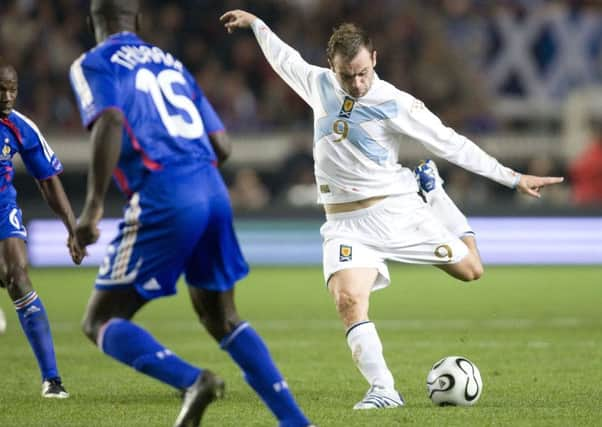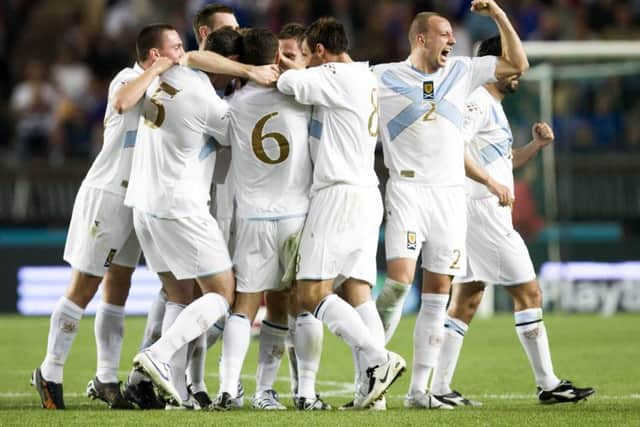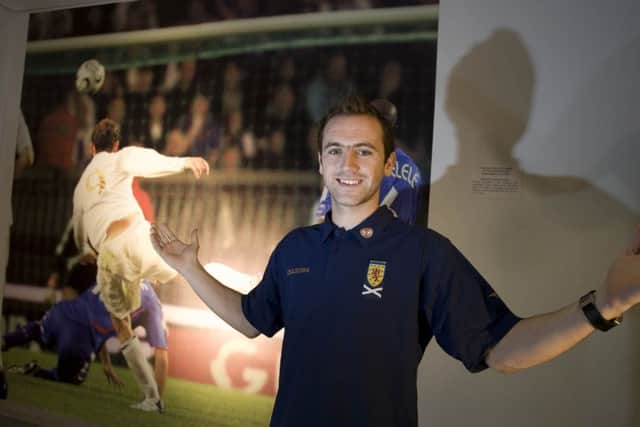Was James McFadden's iconic winner in France really a '˜wonder goal'?


For one Wednesday evening in September ten years ago a coup took place in Paris, the French capital coming under invasion from thousands of Scots.
For one night only, the city could have been mistaken for a Saturday night in Balloch, Bonnyrigg or Brechin; a Scottish enclave 500 miles from the Scottish border.


Advertisement
Hide AdAdvertisement
Hide AdThe Scotland fans who took over Parc des Princes in the 16th arrondissement in the southwest of the city were treated to one of the greatest moments in their Scotland ‘careers’ and for many, understandably, one of the best days of their lives.
As the Tartan Army embraced the Parisian culture, the high-brow dining, absorbing Degas, Cézanne, Gauguin et al in Musée d’Orsay, the players were preparing for a pivotal encounter in their ambition of upsetting the odds and qualifying for the 2008 European Championships to be held in Austria and Switzerland. It would be the country’s first tournament in 10 years.
Only France and Italy, as well Ukraine, plus those pesky Georgians stood in their way. Yet, as Alex McLeish’s charges limbered up for a special evening, dug the trenches for the expected onslaught ahead they sat second in the group.
A win would take Scotland top after nine games with three remaining.


Speaking to Talking Baws, James McFadden said: “The day leading up to it, the build-up was that we didn’t have a chance but us as team we always fancied it. We had a great team spirit and we had obviously beaten them before.”
Yes. Matchday 3, 7 October 2006. Gary Caldwell gave Scotland a famous win at Hampden Park, earning some revenge over a gloating David Trezeguet.
Nearly a year on, history couldn’t repeat itself. Could it? Not against the likes of Lillian Thuram, Eric Abidal, Patrick Viera, Franck Ribery, Claude Makelele, Trezeguet and Nicolas Anelka. Surely.
However, the Scotland team which lined up in front of around 42,000 in the city’s second stadium was one which knew how to win. There was a mix of Rangers and Celtic players as well as those who have tested themselves in England.


Advertisement
Hide AdAdvertisement
Hide AdThere was a steel, a backbone, a structure. Defend, frustrate, close space, infuriate, hope.
That hope came in the shape of James McFadden. He was initially meant to be starting as a second striker until injury ruled out the indefatigable Kenny Miller. Instead of a fly buzzing around the French backline, there was the more restrained presence of McFadden. A completely different proposition.
To many he was the darling of the Tartan Army, the artist among the artisans, the player who would go left when everyone else when right. For a time he was Scotland’s inspiration. He had produced famous special moments in the past. And he had an inkling about the future as the team trained ahead of the qualifier.
“The night before we were practising on the pitch and usually when you go away playing against different teams they have different balls because of sponsorship.


“We used the Adidas ones and they were flying in left, right and centre, so if I thought if I get a chance I am definitely going to have a shot.”
It took France 16 minutes to have a shot on target, yet Scotland had not so much set up camp inside their defensive third as built a couple of tenement flats, a pub, bookies with a Spar set to go in once planning permission was approved.
The Scots’ comfort was shaken after half-time, however, with Craig Gordon required to produce two excellent saves from Ribery and Anelka.
Then the time came.The 64th minute. McFadden, who had cut an isolated and frustrated figure in attack, collected that Adidas ball. The ‘Teamgeist’, the version before the infamous Jabulani.
Advertisement
Hide AdAdvertisement
Hide AdGordon launched a goal-kick deep into the French half. The defenders backed off as a unit leaving McFadden alone behind the midfield two. The Scot summoned the ball from the sky, swivelled and, with that audacity which so endeared him to Scotland fans, hit it.
“I probably shouldn’t have shot, it wasn’t even a half-chance,” he told The Sun. “I probably should have held it up, but thank goodness I had a go.”
Thank goodness he was facing a goalkeeper named Mickaël Landreau.
Fans in France, Scotland and around the world lost their collective minds, commentators went ballistic. The way Scotland were set-up, it was the only avenue in which three points were to be won.
The magnitude of the goal and result is given even more credence since it was eight years since France had lost a competitive game at home, and that Scotland had not won in France in 57 years.
The euphoria and adrenaline help us understand why some called it, and still call it, a ‘wonder goal’.
But it wasn’t. Yet, ten years it is treated as some sort of divine magic. It was a goalkeeping error.
The ambitious strike from 30 yards out should have been saved, McFadden admits that himself. It was unexpected, yet the ball travelled a long distance. It was left of centre and a perfect height for any goalkeeper to push over the bar.
Landreau pushed it into the net.
Advertisement
Hide AdAdvertisement
Hide Ad“I would have preferred it if it had gone straight in. I’m funny that way,” McFadden said.
“Their keeper got his hand to it and should have saved it.”
Can a goal which a keeper should have stopped be labelled a wonder goal or even a great goal?
It will rightly takes its place in the pantheon of iconic Scottish goals, alongside Leigh Griffiths versus England, Archie Gemmill against the Netherlands, Dave Narey against Brazil, Kenny Dalglish against England etc.
It provided a wonderful moment and a great result. It was memorable but it was not a great goal, let alone the ‘best’.
However, it propelled Scotland to the top of the group with a tricky away fixture in Georgia. Hope was rife. Failure was around the corner. Defeat in Georgia and then an Italian job at Hampden saw Scotland eventually miss out, finishing third, two points behind second place France.
It is now coming up to 20 years since Scotland last dined at a finals tournament. Ten years on from McFadden’s goal, the country could do with another goalkeeping mistake next month against Slovakia.
